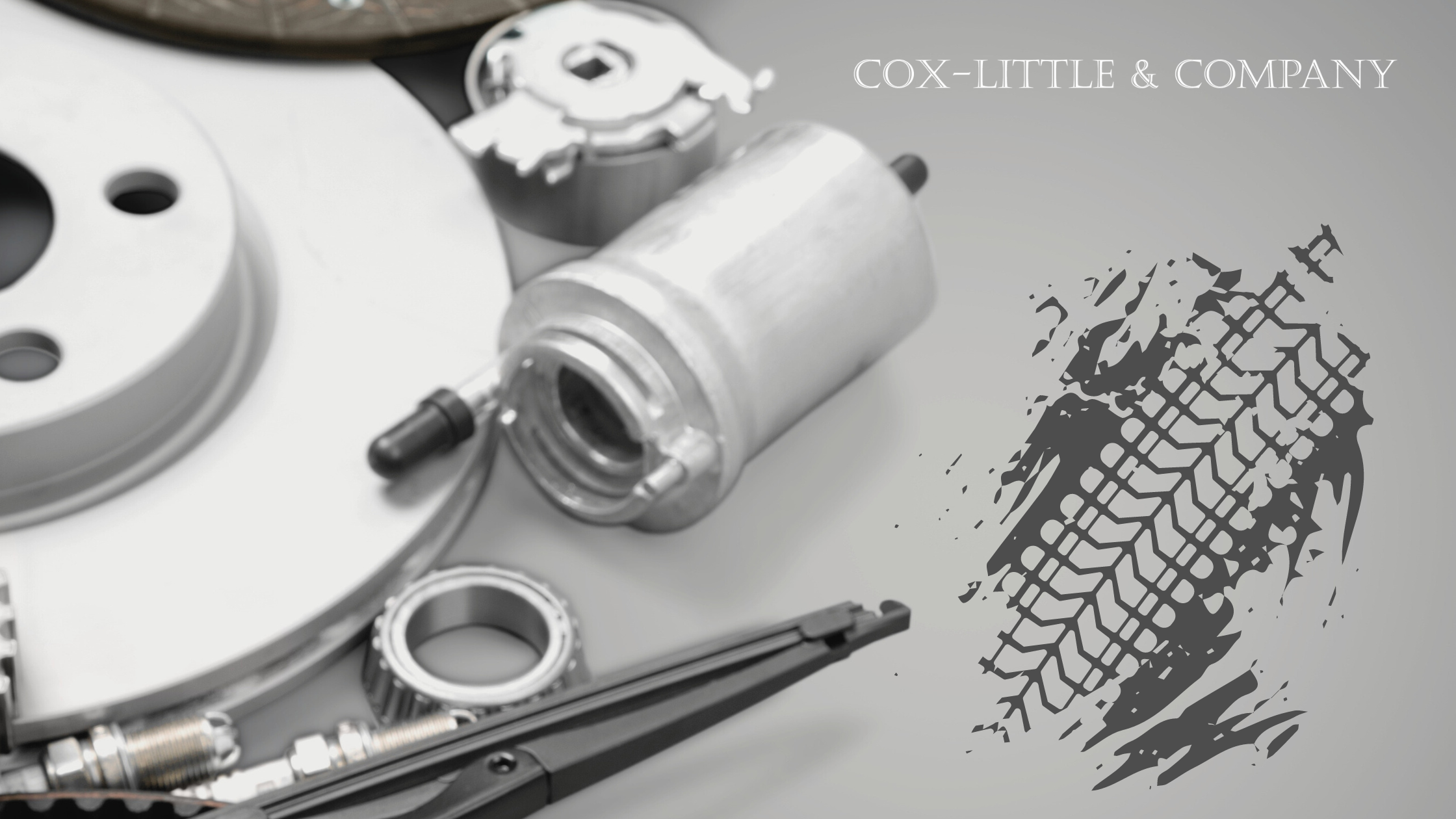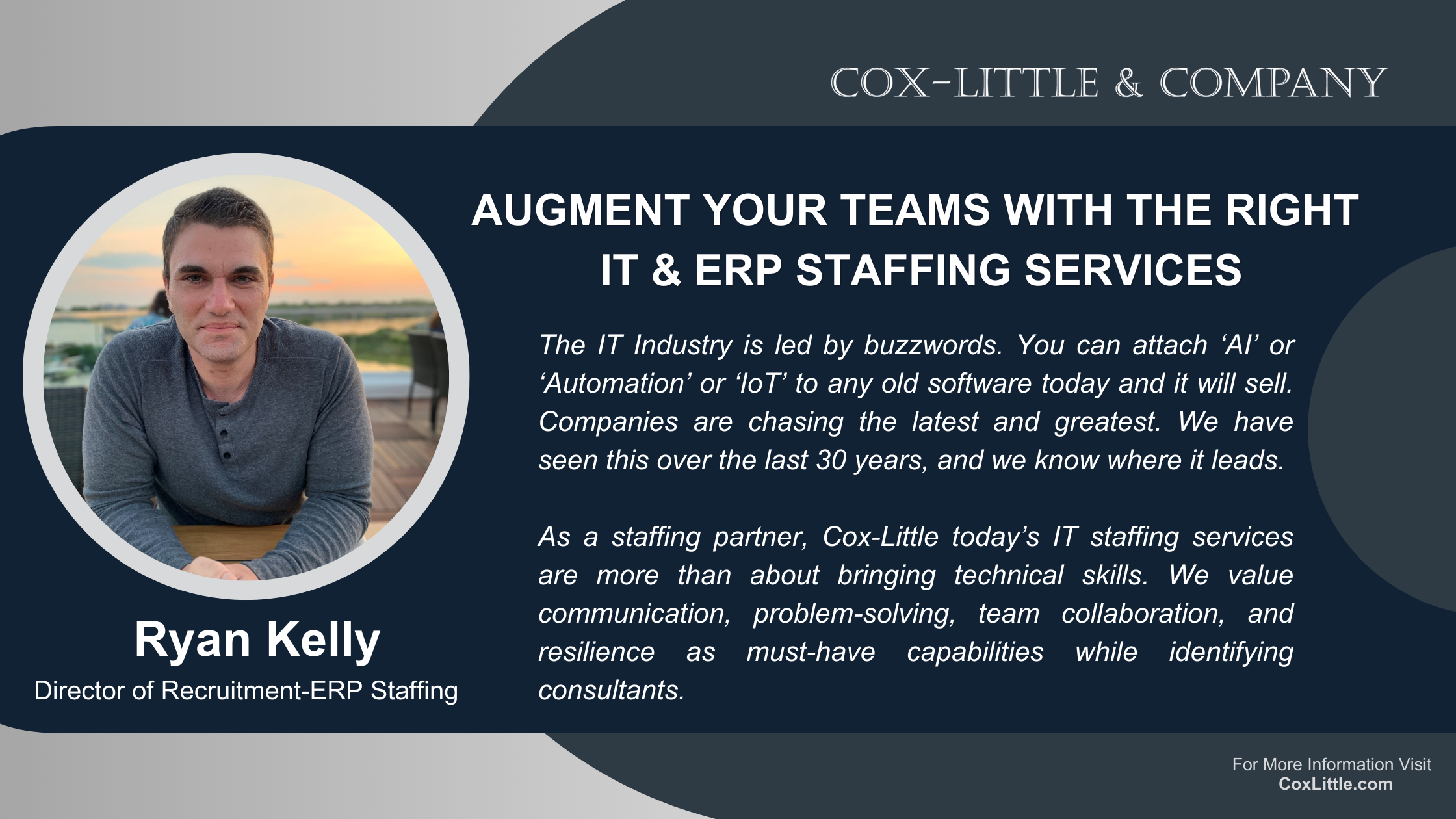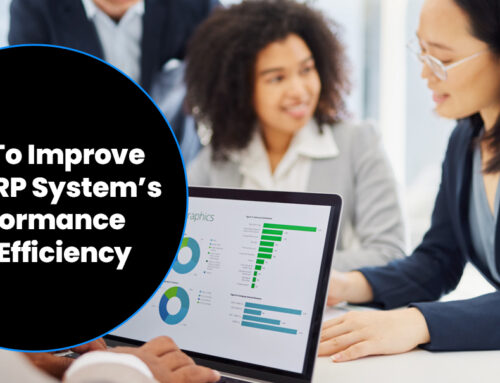
Ryan Kelly, Director of Recruitment-ERP Staffing answers our questions in this (part two) series on the state of automotive parts manufacturing.
Get his feedback and thoughts on the automotive manufacturing industry as well as the challenges with sourcing and qualifying ERP talent.
Ryan has more than a decade of experience in IT recruitment and staff augmentation focused on enterprise applications including ERP software (SAP, Oracle, NetSuite, WorkDay, JD Edwards, MS Dynamics, Epicor, and Infor).
If your automotive manufacturing business is looking to build the ERP talent muscle, then read below to get Ryan’s critical insights on IT executive sourcing through his leadership lens.
Question 1: What can automotive manufacturers expect in 2024 and beyond?
Ryan: We are at an exciting time confronted by disruptions, innovation, and unprecedented changes to both supply and demand. The automotive industry is no exception. The competition is fierce, and there are new players in the industry. It is not just the cars and vehicles that look different; new sustainability targets, customer sentiments, and environmental, social, and governance (ESG) initiatives are driving the auto industry to reimagine its business models and processes.
There will be cycles of struggles and shortages of talent and expertise while transitioning from traditional mobility to electromobility, connected vehicles, sustainability, and enhanced safety and efficiency. Economic and supply chain setbacks do not mean the automotive technology innovations are slowing down. Advanced technologies are no longer just ‘nice to have’; they are essential for auto parts makers, OEMs, and suppliers to dynamically respond to demands of superior buying experience, product innovations, and supply chain resilience. New jobs, manufacturing processes, and workflows create the need for skills and experience to expand automotive ERP use cases to meet the specialized needs of automotive manufacturers and suppliers. Changes and fluctuations in supply have created increased demand for accurate Forecasting abilities.
Tech teams and hiring managers in this industry will continue searching for talent to support their cloud and DevOps initiatives, AI development, manufacturing automation, digital transformation projects, and data security, privacy, forecasting and analytics. Skilled labor is in high demand and that will only continue. We have not seen the supply of labor keep up with this ever-expanding level of demand.
Adapting to a new system across the manufacturing value chain can take time to happen. Attracting and retaining top talent to support transformation initiatives is time-consuming and resource-intensive. Unlocking contingent workforce or contract professionals like independent ERP consultants at a fraction of the cost helps keep up with the project plans and the flow of innovation with minimal disruption. Most auto-industry companies feel the need to reach out to the vendor when they have an urgent project that must be resolved in a timely fashion. Vendor resources kill IT budgets, limiting the ability to expand staff and add valuable technology.
Third-party experts in IT staffing services and staff augmentation like Cox-Little & Company, who specialize in independent consultants with subject-matter expertise in this arena will provide flexibility both in billable hours and budget. While utilizing independent resources, organizations can expect talent with equivalent knowledge, or better than what the vendor provides at top dollar. Think of it this way… when a top-tier vendor consultant reaches that level, after 5-10 years, there is no upward mobility. The next career option is to go independent. And while working independently, they can make significantly more money themselves, yet will cost clients significantly less. Vendors and top-tier consulting firms’ markup the cost of consultants by 100-200%. I have worked for them and know from experience.

Question 2: Why hire a contingent workforce for ERP Projects in the automotive industry?
Ryan: No matter what change any industry undergoes, all businesses need one thing—radical transparency into the processes, stakeholders, teams, operations, and data. Most of our clients in the manufacturing industry are already aware of the standard ERP promise —achieving a ‘single source of truth’ and other capabilities. However, only a professional with a 360-degree understanding and experience working with an automotive ERP platform would know how to use the solution well to achieve pre-defined business, operational, and technological goals. In layman’s terms, contract IT talent or third-part staffing, including ERP professionals, are meant to augment teams.
By using contingent workers of an IT staffing services provider, you can hone in on the skills that matter. What are the skill gaps that you need to make this project excel? We will come back to you with 3-4 independent consultants who are experts in those areas.
Hiring a contingent workforce for enterprise IT needs helps ensure the in-house candidate pool of technology professionals is not flooded with tasks that eventually lead to burnouts and resignation. Also, the contingent staff can train current team members on those skill gaps and expand the internal team knowledge for future projects.
From the cost standpoint, this is a better option. This industry pays about $7.2 billion in paychecks for millions of workers across the U.S. Average IT and Tech industry stats reveal that 89% of technology professionals are willing to take up full-time positions only if they are offered a salary raise (an average 18% increase). Bringing in contract professionals and consultants open to interim and permanent IT roles will be much more affordable. When billed on an hourly basis, you can use the contingent staff as needed. You have full control of the budget because you are not beholden to a specific timeline. The contract can start and end when you determine necessary.
Question 3: Who can help meet the specialized IT staffing needs of automotive parts manufacturers?
Ryan: Since 1985, Cox-Little & Company has been solving one of the biggest problems of many industries—sourcing skilled talent resources to support enterprise IT application projects outside of the vendor. We find certified, experienced, and pre-vetted IT talent to work in full-time positions and independent consultants. We have a network of 500,000 independent consultants, all with expertise in Enterprise Applications for the manufacturing industry.
Availing consulting services directly from an industry-leading vendor will be expensive for many automotive manufacturers or small to medium-sized suppliers of auto parts. Moreover, IoT, AI, and ML resources are hard to find and are beyond the hiring budget of many customers. When it comes to ERP, not everything is plug-and-play. ERP Implementation and customization journeys are full of epiphanies that businesses may not be fully prepared to deal independently.
ERP configurations, implementations, and customizations require core ERP product knowledge and subject matter expertise. We often find that the staffing needs of automotive manufacturers are much more nuanced. Our company hires talent who understands the latest ERP software and cloud versions and can provide insights into upgrades and rollouts across production units and manufacturing locations. Our technical ERP consultants will offer in-depth technical information at both hardware and software levels relevant to a specific industry. Again, most independent consultants are ex-vendor consultants. They have made it to the top tier of the vendor consulting world and have moved on to independent consulting.
Suppose a business is used to legacy or any end-of-life manufacturing ERP system. In that case, we find experts who are adept in planning seamless upgrades and transitions or assessing licensing options of other ERP vendors.
Question 4: Any final take-away on automotive ERP for 2024?
Ryan: Do not do it all. Even though you may choose the best enterprise solution in the market, finding your way around it requires balancing your business and technological needs. Off-the-shelf ERP solutions are complex and restrictive without an expert’s participation. It takes a lot of skilled individuals and resources to realize the full potential of IT investments. Errors open doors to learning but also create additional costs to your organization.
The IT Industry is led by buzzwords. You can attach ‘AI’ or ‘Automation’ or ‘IoT’ to any old software today and it will sell. Companies are chasing the latest and greatest. We have seen this over the last 30 years, and we know where it leads. A discombobulated IT department, with a mess of systems that do not interface with each other, that do the same thing, and are a drain on budgets. It leads to a consolidation phase and most of these “must-have systems” of ten years ago are forgotten and removed for improved products.
Moreover, today’s IT staffing services are more than about bringing technical skills. We value communication, problem-solving, team collaboration, and resilience as must-have capabilities while identifying consultants. As a staffing partner, Cox-Little prioritizes skill relevancy. Knowledge and experience of using innovative AI and automation tools powered by algorithms are necessary as ERP providers continue to integrate AI capabilities into their platforms.
If you envision augmenting your teams with IT and ERP staffing and consulting for the next quarter of 2024, your question shouldn’t be whom to hire, but where to hire? The answer is Cox-Little & Company.
Connect to get in touch with our team for your IT staffing milestones for 2024.






Leave A Comment